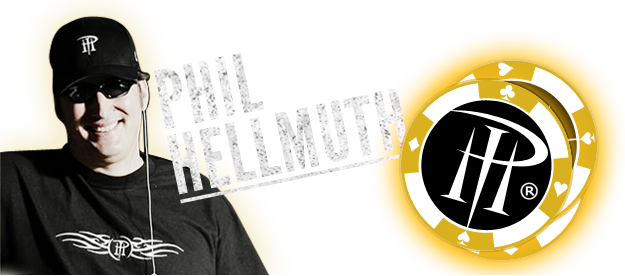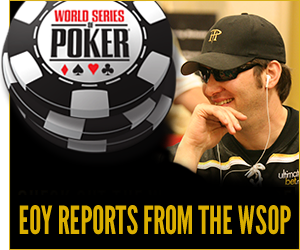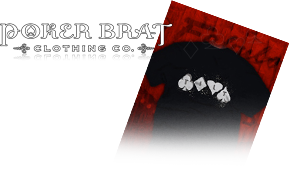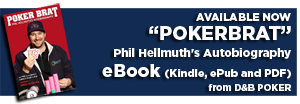-
The Big One at the Bike
This year the $5,000 buy-in World Poker Tour (WPT) tournament at the Bicycle Club in Los Angeles brought out more than 800 entrants (with a first place of $1.1 million). This championship finale, capping a one-month-long series of tournaments in August, has some serious history and prestige, and has been on all the top poker players’ schedules for 17 years running. And that prize pool has changed over those years! Way back when, in 1988, I won this event and a whopping $145,000, out of a prize pool of $365,000. In 1989, I finished in third place, and the prize pool had already risen to $800,000. But about 1996, that upward trend reversed course, and by 2001 a mere 32 players entered, fighting for a prize pool of just $160,000.
Of course, in 2005, with 816 players, the prize pool was $4,07 million! With that many players, we had to have a split two-day start, and I drew day one. I made it through Saturday (day 1), and came back to face the other 301 players on Monday. Things didn’t go well for me in the first couple of hours of play, and my starting chip stack of $24,000 was now down to $8,200.
With the blinds at $300-$600, I opened for $1,600 with Ac-Kh, and Player G called from the small blind. After a flop of Qd-4h-4d, Player G checked, and I studied for a moment. I could beat A-J, A-10, K-J or A-x suited (like Ah-5h), but not too much else. Any pocket pair that G may have started with still had me beat, and if he held A-Q, K-Q or Q-J, then he had outflopped me by hitting a pair of queens. Finally, I decided that there was about a 40 percent chance that I still had the best hand, and a good chance that he would fold a small pair if I bet something.
So I bet $1,800. Now Player G began to study for a while, and after a full minute (a long time to wait with a weak bet out there!) he raised it up, moving all-in. Now my decision seemed clear: it was to fold. Although Player G may have had a flush draw, I thought that he had hit a pair of queens, or had a pair of sevens (or another pocket pair) as hole cards.
As for the rest of the tournament: about 10 minutes later I moved all-in for my last $5,000 or so with Ah-Jh in the big blind, after a player opened for $2,000. My opponent happened to have A-Q, and he “felted me” (Phil “the Unabomber” Laak’s phrase for losing all of your chips) when neither of us improved our hands. Still, I didn’t have a problem with the way I played my Ah-Jh.
But inevitably, the question of how I had played the earlier A-K hand bothered me. Could I have bet more before the flop? Could I have called $600 before the flop? Could I have moved all-in on the flop and won the pot? (Not if Player G had a queen!) Could I have checked on the flop? After running through the hand and various scenarios in my head, I decided that I had played the hand about as well as I could have.
By the way, my second choice for how to play the hand was to call the $600 before the flop, and then move all-in if someone else raised it up after I called — getting all of my chips in before the flop. My third choice would have been to bet $3,000 before the flop, thus committing myself to the pot for the rest of my chips, no matter what the flop might prove to be.
Given a choice while holding A-K and a small stack of chips, you would rather:
A) raise it up three times the value of the big blind or so
B) fold your hand
C) call before the flop
D) none of the aboveAnswer: B
Related Posts
- ‘High’ Stakes Poker
- Going for the Big M in Monte Carlo
- Still Doing Monte Carlo in Style
- Doing Monte Carlo in Style
- Hot Streak Freezes With a Cooler
- Chan Goes Down in the TOC
- Tournament of Champions
- Nice Guy Flushes Hellmuth’s Victory
- No-Limit at Roddick’s House
- Leaving 14 Dimes in the Sand
Recent Posts
- WSOPE 2nd place finish
- Update from this years WSOP 2019
- Happy Holidays! Updated stock at Poker Brat, new book!
- Phil Hellmuth wins historic 15th World Championship!
- Final golden ticket winner coming soon
- Poker Brat – The Phil Hellmuth Jr. Autobiography
- Phil Hellmuth’s “Pokerbrat” – Coming soon to audio book!
- Poker Night in America – Sugar House Casino
- Sugar House w Matt Glantz
- Lost and found
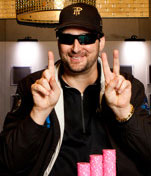
 ™
™



